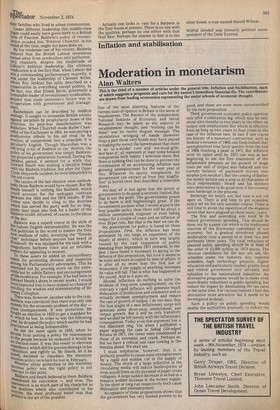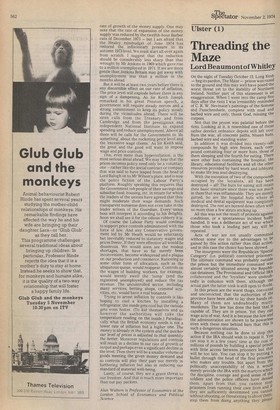Inflation and stabilisation
Moderation in monetarism
Alan Walters
This is the third of a number of articles under the general title, Inflation and Stabilisation, each of which suggests a prognosis and cure for the nation's immediate financial ills. The contributors are drawn from leading economists representing the major schools of economic thought.
One of the most alarming features of the current state of opinion in Britain is the sense of hopelessness. The Review of the independent National Institute of Economic and Social Research may be taken as the essence of establishment thought, and "nothing can be done" was its recent August message. The ostentatious wringing of hands (however large a part those very hands may have played in making the mess); the lamentation that there is no 'at-a-stroke' cure and 'we-must-grinand-bear-it'; all represent at least some belated compromise with reality. I welcome them. But there is nothing that can be done to prevent the combination of an accelerating inflation and growing unemployment for the next year or two. Whatever its spotty complexion, no government can extract us from this 'stagflation' (a horrid term that described a miserable state). We may all at last agree that the power of governments to do good is severely limited. But that is not the point. The governments power to do harm is still frighteningly great. If the Government pursues what I would argue is the best possible policy then there will be about a million unemployed, stagnant or even falling output for a couple of years and an inflation of over 20 per cent. But that is the best we can do.
My prescription for policy is based on three propositions. First, the inflation has been generated by too large an expansion of the supply of money, which in turn was largely caused by the vast expansion of public spending from September 1971 onwards. In the past I have found it necessary to spring to the defence of this proposition; but now it seems to be more and more accepted by men of affairs. It is after all no more than the first law of economics: if the supply of anything increases its value will fall. That is what has happened to the pound. And so it goes on.•
Second, inflations do nothing to solve the problem of long-term unemployment; on the contrary a rapid inflation will generate much dislocation of production and commerce and so actually increase unemployment and reduce the rate of growth of output. I do not deny that the first stages of a new inflationary surge will generate some short-term employment and output growth. But it will be only transitory and we shall be left merely with the inflationary consequences. Today even this argument has a not dissonant ring. Yet when I published a paper arguing the case in Sebag Gilt-edged Review in 1971, the views were condemned as those of an extremist and crank. Perhaps so, but we have a critical test case coming in the months ahead. We shall see.
I must emphasise, however, that it is perfectly possible to cause mass unemployment by a rapid and sudden cut in the supply of money. The shock of a large reduction in the circulating media will induce bankruptcies of even sound firms as the pyramid of paper credit collapses. A large sudden decrease is as bad as a massive sudden increase in the money supply. In the short or long run respectively both cause dislocation and unemployment.
Acceptance of these propositions shows that the government has very limited powers to do good, and these are even more circumscribed by the next proposition ....
Third, government economic policy operates only after a substantial lag, which may be only about nine months to two years in the effect on output and employment but which is effective from as long as two years to four years in the case of the inflation rate. In fact if one traces the history of a monetary contraction, such as Jenkins's swueeze of 1969, one finds indeed that unemployment rose fairly quickly from the end of 1969, reaching a peak in 1971. But inflation went on apace until by 1971 one was at last beginning to see the first abatement of the inflationary pressure as the growth of wage costs per unit of output was reduced and our current balance of payments moved into surplus (yes surplus!). But the coming of Barber the money-printer put a stop to all that sense of fiscal responsibility. Heath and his minions were determined to do good even if the country went bankrupt in the process.
Bankrupt we nearly are, but ruin is not yet upon us. There is still time to get economic policy set on the only sensible course. There is still time to avoid the repetition of the massive errors that have plagued us these many years. The first and overriding aim must be to reduce government spending. This should be done, not by a panic cut which is the traditional reaction of the Keynesian custodians of our economy, but a gradual slowdown phased deliberately over a period of at least two and preferably three years. The total reduction of planned public spending should be at least of the order of £3,000 million at 1973 prices. The obvious candidates for the axe are aid, the subsidies under the Industry Act, regional subsidies, high technology projects, higher education and particularly student grants, local and central government civil servants, and subsidies to the nationalised industries. An alternative programme would be to make even more drastic reductions in public spending, but reduce the impact by diminishing the tax rates at the same time. For various reasons 1 find this alternative more attractive but it needs to be investigated in detail.
Such a policy on public spending would enable the authorities gradually to reduce the rate of growth of the money supply. One may note that the rate of expansion of the money supply was reduced by the twelfth-hour Barber cuts of December 1973 — but I am afraid that the Healey minibudget of June 1974 has restored the inflationary pressure to its
autumn 1973 level. We must start all over again from scratch. I suggest that the reduction should be considerably less sharp than that wrought by Mr Jenkins in 1969 which gave rise to a million unemployed in 1971. If we are more gentle than Jenkins Britain may get away with unemployment less than a million in the months ahead.
But it will be at least two years before there is any discernible effect on our rate of inflation. The price level will explode before there is any sign of a dampening. As Sir Keith Joseph remarked in his great Preston speech, a government will require steady nerves and a strong commitment to keep its policy steady during the vicissitudes ahead. There will be siren calls from the Treasury and from Cambridge and from the prestigious and independent National Institute to expand spending and reduce unemployment. Above all there will be calls for the Government to 'do something' about the rocketing price level and the 'excessive wage claims.' As Sir Keith said, the great and the good will want to impose wage and price controls.
i his, even more than hyperinflation, i.s the most serious shoal ahead. We may hear that the prices-incomes policy need only be a voluntary one — rather like the social contract or compact that was said to have leaped from the head of Lord Balogh on to Mr Wilson's plate, and is now the polite fiction of the Labour Party's platform. Roughly speaking this requires that the Government rob people of their savings and subsidise food, housing, etc, in return for which the leaders of the unions have agreed that they might moderate their wage demands. Such transparent nonsense does not even take in the leader writers of the Guardian. Every union boss will interpret it according to his delights. Soon we shall see it for the odious robbery it is.
Of course the Labour Party would continue to support price controls administered with the force of law. And any Conservative government led by Mr Heath would be reluctantly but inevitably reduced to statutory wages and prices freeze. If they were effective all would be disastrous. We would soon see the modest shortages, that have so far merely been inconvenient, become widespread and a plague on our production and commerce. Rationing or some other form of allocation, such as the ubiquitous queue, would reappear. Controls on the wages of building workers, for example, would merely swell the 'lump' (and the registered unemployed) and reduce the tax revenue. The uncontrolled sector, including many services, betting shops, criminal activities, etc, would have a real bonanza.
Trying to arrest inflation by controls is like hoping to cool a kitchen by installing a refrigerator; the inside gets cool but the outside gets even hotter. (To kid themselves and us however the authorities will take the temperature reading on the inside.) Paradoxically what the British economy needs is not a lower rate of inflation but 'a higher one. The money is already in the system and the quicker our level of prices is adjusted to that quantity the better. Moreover regulations and controls will result in a decline in our rate of growth of output and perhaps even a significant decline in the level. Then there will be a smaller volume of goods meeting the given money demand and so controls will play their part not merely in furthering inflation but also in reducing our standard of material well-being.
Lastly, of course, they are a grave threat to our freedom. And that is much more important than our pay packets.
Alan Walters is Professor of Economics at the London School of Economics and Political Science



































 Previous page
Previous page